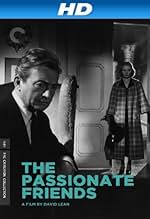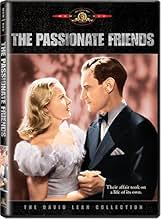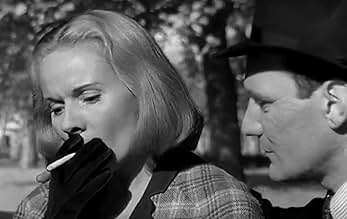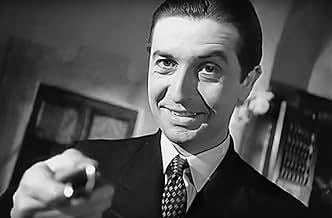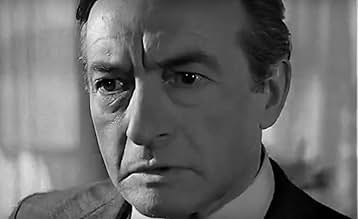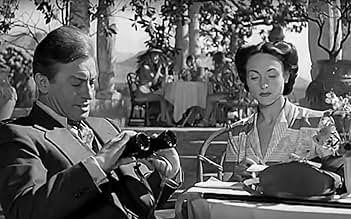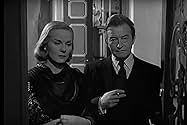VALUTAZIONE IMDb
7,2/10
3351
LA TUA VALUTAZIONE
Una donna incontra un uomo il quale lei fifiutò diversi anni prima.Una donna incontra un uomo il quale lei fifiutò diversi anni prima.Una donna incontra un uomo il quale lei fifiutò diversi anni prima.
- Premi
- 2 vittorie e 1 candidatura in totale
Hélène Burls
- Flowerwoman
- (non citato nei titoli originali)
Amy Dalby
- Lady on Underground
- (non citato nei titoli originali)
Lisa Daniely
- Cinema Usherette
- (non citato nei titoli originali)
Max Earle
- Third Man - Albert Hall
- (non citato nei titoli originali)
Edward Evans
- Underground ticket officer
- (non citato nei titoli originali)
Arthur Howard
- Smith - Butler
- (non citato nei titoli originali)
John Huson
- First Man - Albert Hall
- (non citato nei titoli originali)
Wilfrid Hyde-White
- Lawyer
- (non citato nei titoli originali)
Charles Lloyd Pack
- Man Drinking with Stratton
- (non citato nei titoli originali)
Guido Lorraine
- Hotel Manager
- (non citato nei titoli originali)
Ina Pelly
- Second Woman - Albert Hall
- (non citato nei titoli originali)
Helen Piers
- First Woman - Albert Hall
- (non citato nei titoli originali)
Marcel Poncin
- Hall Porter
- (non citato nei titoli originali)
Recensioni in evidenza
This Rank/Cineguild production directed by David Lean is based on a novel by H G Wells, here adapted by Lean and Stanley Haynes, though with a screenplay credited to Eric Ambler. Although the plot is about a triangle, Lean's focus is on Ann Todd as the woman between two men, her husband and the man who was her first love but whom she refused to marry. Her situation is presented in an exchange between the man, Trevor Howard and Todd - "If two people really love each other they want to be together. They want to belong to each other", Todd - "I want to belong to myself", "Then your life will be a failure". However in the tradition of upper class Brits, Todd's life of failure means a marriage to a successful banker, Claude Rains. The narrative has an unusual triple flashback structure, which is perhaps why it needed three writers, with the present being narrated by Todd with the prospect of a divorce, and flashbacks to the vacation in Switzerland where the instigating incident occurs, Todd's memory/flashback of 9 years earlier re-meeting Howard, and small memories of their first romance. The initial meeting is tainted by lines like Todd's "Why can't we be in love without the clutching and gripping", though later Todd admits to "not being a very good person". Howard's character has his ambiguities too, being a university biology lecturer who knowingly has an affair with a married woman. The infidelity gets a funny spin by Rains' business with Germany and Italy pre-WW2, and Rains saying he has "a taste for intrigue", though the film being made post-WW2 allows him to speak of the "Teutonic hysteria" of the Germans. In spite of some of Lean's technical touches, the thing that de-passionates the situation is Todd, in her first film for her then husband. Whilst at times she resembles Garbo, the rather butch Todd lacks the divine one's expressiveness, with Lean reduced to filming her running from Howard in slow motion to give her some lyricism. All three of the leads are oddly lit indelicately, perhaps to suggest that all this passage of time has aged them, but this with Todd, adds to the destruction of romantic intent. Lean provides a vocal montage of telephone conversations, cuts from a kiss to a bunch of flowers, doors slamming to a typewriter slide of the divorce document, gives Rains a cuckold paranoid montage, and has a "Keep Smiling" poster featured in the background of the climactic scene in the train underground, though the idea of Todd not buying a ticket before she enters rather pre-empts things. Rains has the audience empathy, even if the odd way he stand in a ¾ pose when he confronts someone seems silly. He is the more emotional of the three, but because of the British standards of polite behaviour, his yells are either heard off-camera or with his back to us. The best scene reads as Hitchcock-influenced with Rains dictating to his secretary and Lean continually cutting to a pair of tickets to a play Todd and Howard go to see. The title First Love gets a comic payoff when we hear it is a musical with a fatuous title song.
Invariably this film is bound to be compared to "Brief Encounter" and I guess that's to be expected given they were both directed by David Lean, starred Trevor Howard and featured adultery. Frankly I think any comparison to be unfair because that's where their similarities end. I've seen both and I favor "Passionate Friends". I should add that Ann Todd is not one of my favorite performers. Her demeanor can be expressionless and somewhat off putting. But here she truly shines. In Lean's extensive close ups she reveals inner feelings without uttering a word. And her smiles are explosively radiant. She utterly owns this part. The male parts are equally excellent. All the performances wrap the viewer with their passion and involve him in the characters' fates. This is not light viewing. It's an emotional roller coaster and as the climactic finale unfolded I found myself talking to the screen trying to influence the outcome. Without a doubt this is a story by adults, for adults. Highly recommended.
I was surprised to learn that the original story for The Passionate Friends was written by H.G. Wells. Someone nowadays we identify with the science fiction genre. Certainly it seems to be what has survived best in English literature.
The original story was written in 1913 so some considerable updating was done to make it 1949 contemporary. Lovers Ann Todd and Trevor Howard had an affair back in the day which was ended when Todd's husband Claude Rains found out.
Eleven years go by and Todd and Howard meet at a mountain ski resort in Switzerland. Howard's now married and moved on, but they spend an innocent afternoon reminiscing. Rains catches them and misinterprets with near tragic results.
Ann Todd may be one of the most beautiful women ever to grace the silver screen. She's probably best known in America for being Gregory Peck's loyal wife in The Paradine Case. No wonder Rains is so jealous.
Trevor Howard is essentially doing the same part for David Lean that first got him stardom in Brief Encounter. In fact the story could almost be what happens to the protagonists in Brief Encounter if they met up again in the future. Claude Rains is always right on the money with his portrayals. There's a lot of what John Barrymore did in Maytime in what Rains does here.
If it were done here in the USA, this would have been labeled a woman's picture. It is in fact a nicely done romantic story.
The original story was written in 1913 so some considerable updating was done to make it 1949 contemporary. Lovers Ann Todd and Trevor Howard had an affair back in the day which was ended when Todd's husband Claude Rains found out.
Eleven years go by and Todd and Howard meet at a mountain ski resort in Switzerland. Howard's now married and moved on, but they spend an innocent afternoon reminiscing. Rains catches them and misinterprets with near tragic results.
Ann Todd may be one of the most beautiful women ever to grace the silver screen. She's probably best known in America for being Gregory Peck's loyal wife in The Paradine Case. No wonder Rains is so jealous.
Trevor Howard is essentially doing the same part for David Lean that first got him stardom in Brief Encounter. In fact the story could almost be what happens to the protagonists in Brief Encounter if they met up again in the future. Claude Rains is always right on the money with his portrayals. There's a lot of what John Barrymore did in Maytime in what Rains does here.
If it were done here in the USA, this would have been labeled a woman's picture. It is in fact a nicely done romantic story.
The Passionate Friends (1949)
You wonder how this movie would be told without the Hays Code (and its British counterpart) hovering over the scriptwriter and director. But here we have David Lean's version of the much older H.G. Wells novel (from just before WWI) with all the restraint of movie romances of the period. That is, without our modern idea of passion.
And that's one of the things that makes this really work. It's not about making love on the sly, or going rapturous on screen. It's about the complicated emotional needs and conflicts of three people. That's what passion boils down to, at least in a way that we want to spend time with. And though this is not a full fledged love triangle like "Jules and Jim" (it's one woman caught between two men), it does play with the clashing and melding of three personalities and their passions.
Oddly, you learn fairly soon that the passion of the older man, played by Claude Rains, is deliberately not passionate. That's not what he wants in love. The younger man (not by much) is played by Trevor Howard and he is a sweetheart, with a family, and yet he still has that pure ideal love for the woman he can't shake. Even though she is married to the older man.
The woman holds it all together, both in the story, since she is involved with both men, and in the movie, played with amazing force and nuance by Ann Todd. When she first appeared on screen, thinking to herself on a plane taking off, I thought she was a little like Joan Fontaine, and since I love Fontaine, I was going to be open to this inferior version. But she wasn't inferior one bit. The longer the movie went on, the more I realized what a deeply felt, complex performance Todd gives. She not only has to be a different kind of woman with each of the men, she has to do so in different time periods over about eight years. Great stuff. I want to watch it again just to appreciate her. She was almost wholly a British actress, not moving to Hollywood, and so she never had an American audience the way some of the more famous stars here naturally did. Too bad for everyone.
The movie, as such, has a little inevitability to it--not that we know how it will end, exactly, but that we know how it will probably end, the one or two main options. The rivalry, the jealousy, the caught looks across a train station, the views from the Italian Villa, all the clichés are here. They are all perfectly handled, for sure, but an edge of originality would have helped a lot. I'm very curious to read the Wells book just to see how complex he makes the woman, and the story. And to check the ending he had in mind in 1913.
Lean, the director, is a legend of course. He made so many really fine films, important ones, it's easy to overlook this one. Even the slightly similar (in feel) "Brief Encounter" from 1945 casts a huge shadow here. Throw in "Lawrence of Arabia," "Dr. Zhivago," "Blithe Spirit," "Bridge over the River ." You get the idea.
See this. Expect nothing sensational, and you'll be sucked into a really superb, conventional, beautiful romantic drama. I just read (and gave a thumbs up) to a long review for this film that seems incredibly perceptive, but which maybe forces too much analysis onto the motives of the players here--especially for someone who hasn't seen it yet. I suggest getting sucked in and taking the advice to be patient, but also forging your own view of the events and hearts involved.
You wonder how this movie would be told without the Hays Code (and its British counterpart) hovering over the scriptwriter and director. But here we have David Lean's version of the much older H.G. Wells novel (from just before WWI) with all the restraint of movie romances of the period. That is, without our modern idea of passion.
And that's one of the things that makes this really work. It's not about making love on the sly, or going rapturous on screen. It's about the complicated emotional needs and conflicts of three people. That's what passion boils down to, at least in a way that we want to spend time with. And though this is not a full fledged love triangle like "Jules and Jim" (it's one woman caught between two men), it does play with the clashing and melding of three personalities and their passions.
Oddly, you learn fairly soon that the passion of the older man, played by Claude Rains, is deliberately not passionate. That's not what he wants in love. The younger man (not by much) is played by Trevor Howard and he is a sweetheart, with a family, and yet he still has that pure ideal love for the woman he can't shake. Even though she is married to the older man.
The woman holds it all together, both in the story, since she is involved with both men, and in the movie, played with amazing force and nuance by Ann Todd. When she first appeared on screen, thinking to herself on a plane taking off, I thought she was a little like Joan Fontaine, and since I love Fontaine, I was going to be open to this inferior version. But she wasn't inferior one bit. The longer the movie went on, the more I realized what a deeply felt, complex performance Todd gives. She not only has to be a different kind of woman with each of the men, she has to do so in different time periods over about eight years. Great stuff. I want to watch it again just to appreciate her. She was almost wholly a British actress, not moving to Hollywood, and so she never had an American audience the way some of the more famous stars here naturally did. Too bad for everyone.
The movie, as such, has a little inevitability to it--not that we know how it will end, exactly, but that we know how it will probably end, the one or two main options. The rivalry, the jealousy, the caught looks across a train station, the views from the Italian Villa, all the clichés are here. They are all perfectly handled, for sure, but an edge of originality would have helped a lot. I'm very curious to read the Wells book just to see how complex he makes the woman, and the story. And to check the ending he had in mind in 1913.
Lean, the director, is a legend of course. He made so many really fine films, important ones, it's easy to overlook this one. Even the slightly similar (in feel) "Brief Encounter" from 1945 casts a huge shadow here. Throw in "Lawrence of Arabia," "Dr. Zhivago," "Blithe Spirit," "Bridge over the River ." You get the idea.
See this. Expect nothing sensational, and you'll be sucked into a really superb, conventional, beautiful romantic drama. I just read (and gave a thumbs up) to a long review for this film that seems incredibly perceptive, but which maybe forces too much analysis onto the motives of the players here--especially for someone who hasn't seen it yet. I suggest getting sucked in and taking the advice to be patient, but also forging your own view of the events and hearts involved.
6sol-
A rather early entry in David Lean's career, his directing skills show through in some dramatic moments that require intense atmosphere. Nevertheless, the film is not the best example of Lean's abilities - both before and after it he directed superior productions - but this one is still okay viewing. With many flashbacks melded in with the plot, some are better done than others, and likewise, sequences showing the thoughts and dreams of the characters vary in effectiveness. There is a memorable sequence that features multiple telephone tracks, and there are also a few other neat tricks in the mix. The cinematography is quite good, and the cast keeps the film at an interesting level. Still, it is primarily of interest to followers of Lean's work.
Lo sapevi?
- QuizThis movie is based on the 1913 novel "The Passionate Friends" by H. G. Wells, who also wrote "The Invisible Man", which was made into a 1933 hit movie starring Claude Rains, one of the stars in this movie.
- BlooperWhen Steven barges into Howard's office, he is shown starting to close the door, followed by the sound of a door closing. However, in the subsequent shot, the door is open again.
- Citazioni
Mary Justin: I'm not a very good person, Steven. I wanted your love - and I wanted Howard's affection and the security he could give me.
Professor Steven Stratton: I can give you security too, and more than affection.
Mary Justin: You don't really know me at all. My love isn't worth very much.
- ConnessioniFeatured in Discovering Film: Claude Rains (2015)
I più visti
Accedi per valutare e creare un elenco di titoli salvati per ottenere consigli personalizzati
- How long is The Passionate Friends?Powered by Alexa
Dettagli
- Data di uscita
- Paese di origine
- Lingue
- Celebre anche come
- Apasionada
- Luoghi delle riprese
- Le Brévent, Chamonix, Haute-Savoie, Francia(cable car outing at Brévent in front of Pic du Midi)
- Azienda produttrice
- Vedi altri crediti dell’azienda su IMDbPro
Botteghino
- Lordo in tutto il mondo
- 40.335 USD
- Tempo di esecuzione1 ora 35 minuti
- Colore
- Proporzioni
- 1.37 : 1
Contribuisci a questa pagina
Suggerisci una modifica o aggiungi i contenuti mancanti

Divario superiore
By what name was Sogno d'amanti (1949) officially released in India in English?
Rispondi

